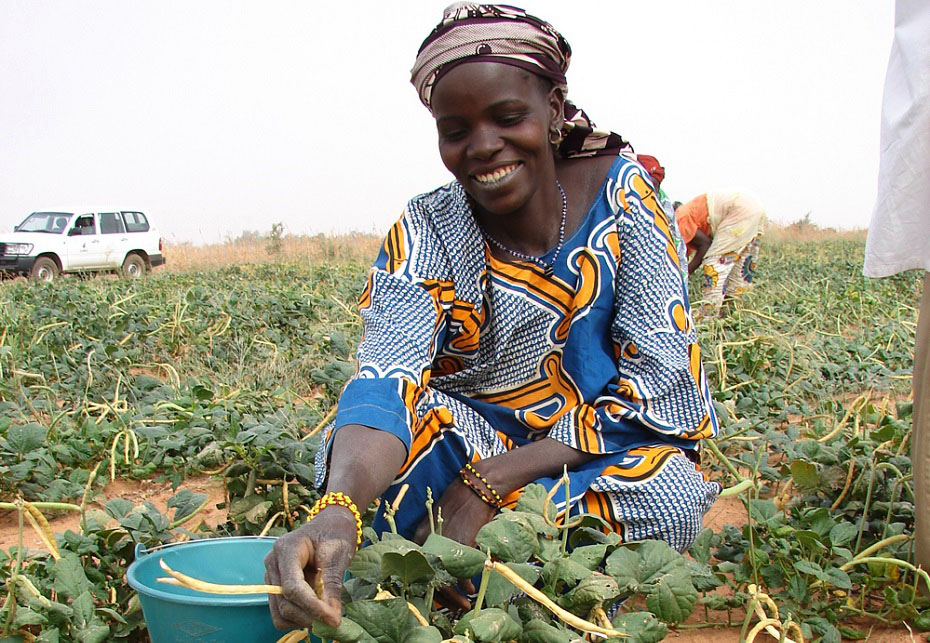
Photo credit: ICRISAT
A cowpea farmer in Africa. Credit: ICRISAT
More than half of all people in Africa are farmers, yet the continent still imports around $35 billion worth of food each year. An estimated 40 per cent of children in sub-Saharan Africa grow up stunted due to malnutrition, affecting their ability to learn.
Reducing hunger and poverty while populations continue to increase requires long-term investment in science and development. Interventions must build on current farming practices rather than imposing new systems or methods.
Initiatives like our involvement in the RIPE project, led by the University of Illinois, are helping to strengthen the global effort to eradicate world hunger and malnutrition by 2030 and beyond.
A significant $45 million, five-year reinvestment from the Bill & Melinda Gates Foundation, the Foundation for Food and Agriculture Research and the U.K. Department for International Development will ensure the continuation of research aimed at addressing the global food challenge.
Realizing Increased Photosynthetic Efficiency (RIPE) is an effort to engineer staple food crops so they can more efficiently turn the sun’s energy into food and sustainably increase global food productivity.
High on growth, low on food
We will be a key partner in the second phase of RIPE, bringing expertise in research on cowpea, a highly nutritious grain crop that is eaten by more than 200 million people in Africa.
Cowpea has a remarkable ability to thrive in dry environments, and it also puts nitrogen, an important fertiliser, into the soil. But despite these wonderful growth attributes in tricky environments, cowpea productivity from a crop yield perspective is low.
Our scientists have already developed technology that will see smallholder farmers grow cowpea crops from 2018 that are resistant to the highly destructive podborer.
Our researchers will be challenged to use their expertise in gene transfer technology to not only increase biomass in cowpea but take it one step further to increase grain yield. RIPE is investing in research on a number of strategies that aim to increase yields to keep up with increasing populations, and the more hungry mouths there are to feed.
The first round of RIPE research has shown that crop productivity could be increased by up to 20 per cent, which is a dramatic increase compared to typical annual yield gains of just one per cent or less. It will be up to our researchers to validate the RIPE results in cowpea.
“If we can get a 15-20 per cent increase in grain yield in cowpea then this would have a major impact on food and nutritional security in Africa,” explains Dr TJ Higgins from CSIRO Agriculture and Food.
Dr Higgins estimates this could increase farmers’ current best average yields from 700kg/ha closer to one tonne/ha.
Bringing cowpea to the world’s hungry
The ultimate aim is to develop an elite cowpea that breeders can use to produce varieties that are preferred by farmers and suited to different growing areas.
RIPE and its funders will ensure their high-yielding food crops are globally available, particularly in sub-Saharan Africa and Southeast Asia, and affordable for smallholder farmers to help feed the world’s hungriest and reduce poverty.
But there is still a long road ahead: it takes about fifteen years from discovery until crops with these transformative biotechnologies are available for farmers. It will therefore be well into the 2030s before such superior crops are seen at scale in farmers’ fields.
RIPE is led by the University of Illinois in partnership with the United States Department of Agriculture/Agricultural Research Service, University of Essex, Lancaster University, Australian National University, Chinese Academy of Sciences, CSIRO, University of California, Berkeley, and Louisiana State University.


20th September 2017 at 5:54 pm
Holland is rich and fertile, and have been practicing sustainable farming for thousands of years.
The plains of Africa are not comparable, and GM technology ‘is’ the way to go here; regardless of cost.
20th September 2017 at 3:22 pm
The dutch are the most productive farmers in the world. The dutch experience is that selective breeding is cheaper and faster than genetic engineering. Was a cost benefit analysis done on genetic engineering vs selective breeding?
Pingback: The time is RIPE to transform agriculture and feed the world – CSIROscope | Plant Health Solutions